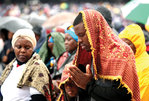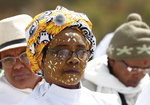


God’s plan for humanity involves community, mutual support, sharing and caring for each other and for the earth, Pope Francis said.
“As we look around us, how many men and women, young people and children are suffering and in utter need. This is not part of God’s plan,” he said Sept. 8, celebrating Mass on a dusty, red dirt field on the outskirts of Antananarivo, Madagascar.
Madagascar is one of the world’s 10 poorest countries. According to the World Bank, 75 percent of the population lives on less than $1.90 a day.
Close to 1 million people gathered on the Soamandrakizay field for the pope’s Mass, according to local organizers. Many had spent the night, sleeping on straw mats or plastic tarps and bundled up against a windy winter chill.
At the beginning of his homily, the pope acknowledged the sacrifice people made to get to the Mass site and the discomfort endured by those who camped out.
Madagascan President Andry Rajoelina, a Catholic, and his wife, Mialy, sat near the front of the crowd as Pope Francis preached about the Gospel call to solidarity and the joy that comes from putting faith before power or possessions.
The pope urged the nation’s people “to make your beautiful country a place where the Gospel becomes life and where life is for the greater glory of God.”
What God wants, he said, is for people to extend a helping hand to others and to let them know that they are loved by God and have a dignity that cannot be taken away and should not be attacked.
The Gospel calls Christians to work for social justice, Pope Francis said. “Together we can resist all those forms of idolatry that make us think only of the deceptive securities of power, career, money and of the search for human glory.”
On Sept. 10, Pope Francis concluded a weeklong trip to southern Africa, which began Sept. 4 and took him to Mozambique, Madagascar and Mauritius.
Statistical indicators show Mauritius’ rapid economic growth has benefited all sectors of society, lifting thousands out of poverty over the past 30 years, but Pope Francis still urged the island’s Catholics to be careful.
The danger is that “we can yield to the temptation to lose our enthusiasm for evangelization by taking refuge in worldly securities that slowly but surely not only affect the mission, but actually hamper it and prevent it from drawing people together,” he said at Mass Sept. 9 on a terraced hillside overlooking Port Louis.
Officials said 100,000 people gathered on the hillside for the Mass. Some held umbrellas while most were wearing straw hats to protect themselves from the sun. The young wore baseball caps.
One of them was Gael Henriette-Bolli, 29, a lecturer in law at a local university. He said it’s true that material well-being and the explosion of technology can distract the young from their faith. But he and his friends in “Pastoral Zenn,” the Port Louis diocesan youth ministry program, are reaching out, especially through Facebook and other social media.
“Some of us young people have attended World Youth Days, and we stay strong,” he said. “And if the value of faith has been inculcated by their family, the youth are still interested.”
Ambal Arokeum, a mother and grandmother from Rose Hill, said the economy growth “has been the benediction of God.”
During his eight hours in Mauritius—making his visit a day trip from Madagascar—Pope Francis urged the local Church and government to make greater efforts to listen to and involve the island’s young people in every aspect of life.
The young people in the crowd cheered their approval.
Mauritius has become a super-success story for development in Africa following efforts to diversify the economy. Rather than relying mostly on sugar cane and textiles, now the country is known for tourism, call centers and “financial services,” which make the country a tax haven for many.
Pope Francis noted how unemployment is a problem, particularly for young adults, which “not only creates uncertainty about the future, but also prevents them from believing that they play a significant part in your shared future.”
Cardinal Maurice Piat of Port Louis has written about the island’s “vocations crisis,” which Pope Francis tied to the question of economic prosperity and attention to the young.
With a courtesy and solemnity seldom seen at a gathering of opposing political leaders, Mozambican politicians came together a month before their general election to welcome Pope Francis and pledge to work for peace and the common good.
The elections Oct. 15 will see the current president, Filipe Nyusi, leader of the Frelimo party, run against Ossufo Momade, leader of the opposition Renamo party, and against Daviz Simango, president of the Democratic Movement of Mozambique.
In the southern Africa country, party politics has not been simply a matter of policy arguments; Frelimo and Renamo were the main opponents in the Mozambican civil war, which raged from 1977 to 1992. Tensions rose again after contested elections in 2013 and grew so sharp that violence flared again. Nyusi and Momade signed a new peace accord Aug. 1.
Welcoming Pope Francis to Palacio da Ponta Vermelha, the presidential residence in Maputo, Mozambique, Sept. 5, Nyusi had both his opponents stand for a round of applause as he pledged their intention to strive to be political leaders who work for the common good and not self-interest.
Pope Francis told the political leaders, as well as other civic leaders and ambassadors serving in Mozambique, that making peace takes more courage, strength and effort than waging war does, but that Mozambique’s own recent history shows how education, health care and the local economy all benefit from peace.
First, the pope publicly expressed his solidarity with Mozambicans still far from recovering from the cyclones Idai and Kenneth in March and April.
Both the pope and president said the nation still needs the promised international aid to help rebuild, but both also said Mozambicans’ reaction to the disasters showed how much solidarity, unity and sacrifice the nation’s people have.
Myrta Kaulard, the U.N. resident coordinator in Mozambique, told reporters, “It’s definitely a good day for peace and reconciliation,” and that, even without strong words, the country would benefit from Pope Francis’ presence.
She also said she was counting on the pope to bring a strong message on climate change, but it was even more important that the pope’s visit showed the world that Mozambique matters. “This, after all, is a quite remote country.”
The themes of peace, reconciliation and care for creation took center stage again at the pope’s next event: an interreligious meeting with about 4,000 young people from Mozambique.
The young people—Christians, Muslims and Hindus—started things off. They welcomed the pope to Maputo’s Maxaquene Pavilion with hands clasped, chanting over and over: “Reconciliation.”
Pope Francis, joining the spirit of the gathering, mostly followed his prepared text, but had the young people repeat several phrases as a chant, including “don’t give up” and “always together.” —CNS